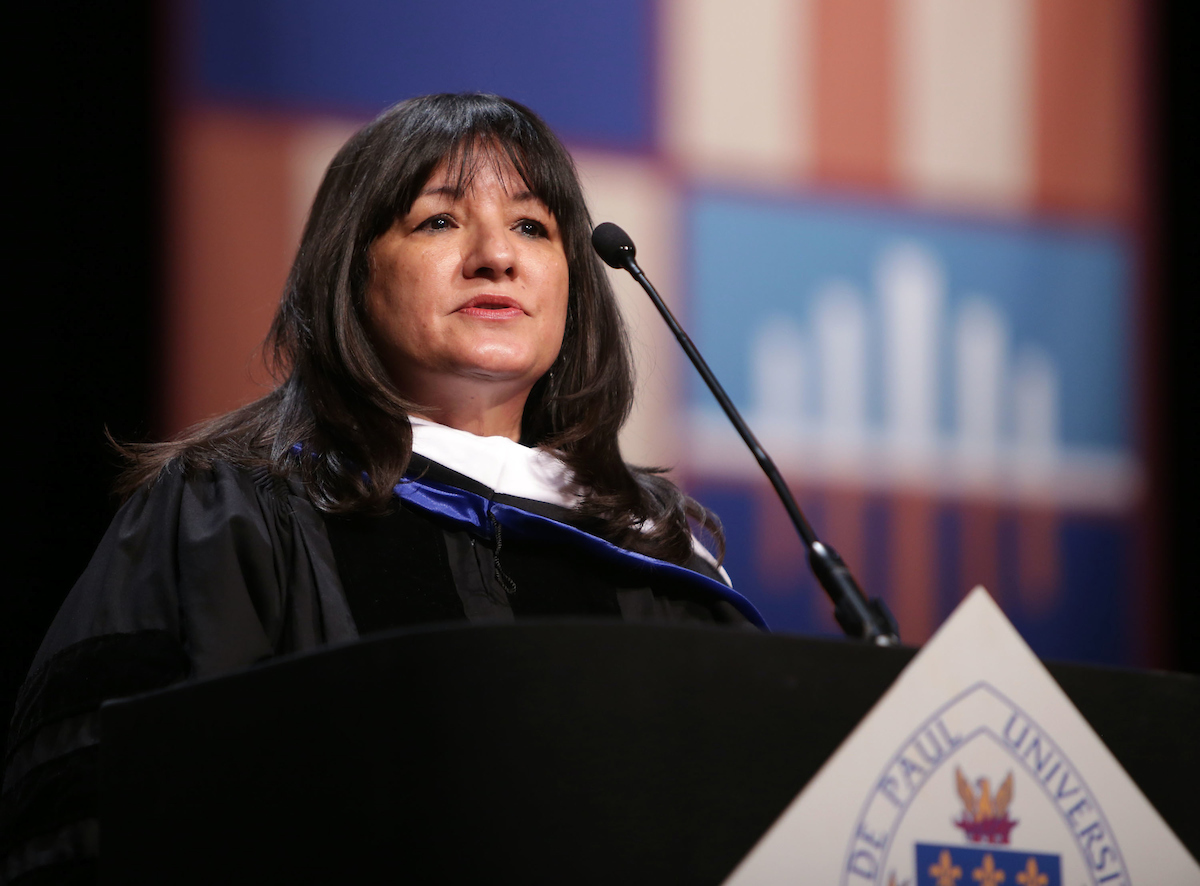 Poet Sandra Cisneros delivers an address and received an honorary degree during one of DePaul's 2014 commencement ceremonies. (DePaul University/Jeff Carrion)
Poet Sandra Cisneros delivers an address and received an honorary degree during one of DePaul's 2014 commencement ceremonies. (DePaul University/Jeff Carrion)
April is National Poetry Month, a time to reflect on and celebrate the impact poets and their works have had on the world. Like literature and visual art, poetry’s role in history is often hidden or easy to overlook. The effects of poetry can be found in unexpected places and the DePaul University archives are no exception. Throughout the years, many poets have come to DePaul’s campus for talks, honorary degrees and as students. By celebrating these writers, DePaul University has continued to show appreciation and support for one of humanity’s most popular art forms.
One of the earliest poets to make a mark on DePaul’s history was a DePaul graduate. Henry W. Rago, best known for his 14 years as editor of "Poetry" magazine, graduated from the College of Law in 1937. Despite his major, Rago was known for his literary prowess during his time at DePaul. Among his many other activities, he wrote for "The DePaulia," was a member of yearbook staff, and wrote for and edited several other student publications. He returned to DePaul to receive an honorary degree on June 9, 1965.
 Poet Gwendolyn Brooks with Michael Mezey, then dean of the College of Liberal Arts and Social Sciences, at a 1994 commencement ceremony. (Image courtesy of Special Collections and Archives)
Poet Gwendolyn Brooks with Michael Mezey, then dean of the College of Liberal Arts and Social Sciences, at a 1994 commencement ceremony. (Image courtesy of Special Collections and Archives)
Among the poets who have visited campus, one name that stands out for both its renown and its continued presence in DePaul’s history is that of Chicagoan Gwendolyn Brooks. She first appears in DePaul’s history on February 6, 1972, when DePaul presented her with an honorary degree at the mid-year commencement ceremony. She returned to DePaul in May 1974 to give an informal reading and attend a reception to speak one-on-one with faculty and students. Nearly 200 members of the DePaul community heard Brooks share her plans for her fifth year as Poet Laureate of Illinois, a position she held from 1968 until her death in 2000, and read her own works, along with receiving an opportunity to acquire an autographed book of her poetry. "The DePaulia" noted that Brooks’ works were “charged with power and vibrancy” and successfully combined “her rich experience in life together with her penetrating insight into the human condition” – clearly, Brooks had many enthusiastic fans at DePaul. DePaul’s enthusiasm for Brooks’ work was proven even further twenty years later, when Brooks was presented with another honorary degree on June 12, 1994.
Chicago native Sandra Cisneros also has an ongoing relationship with DePaul. Though better known for her prose, Cisneros has published multiple collections of poetry and received a National Endowment for the Arts grant for poetry. Cisneros first spoke at DePaul on October 9, 1991. She returned on June 14, 2014 to receive an honorary degree from the School for New Learning. Cisneros, who had a nephew graduating from DePaul that same year, said of receiving the honor, “I cannot repeat often enough the gratitude I feel for this invitation because it’s from my hometown. It feels like now that I’m older, there’s a lot of resolution to past ambivalent feelings I had when I was younger and living in Chicago, so I thank DePaul for being part of that healing.”
As is the case with most other institutions of higher learning, literature and poetry have a strong presence in DePaul’s history. Though this history may not always be readily apparent, the presence of these and other poets on the DePaul campus has helped to make DePaul’s history all the more vibrant.